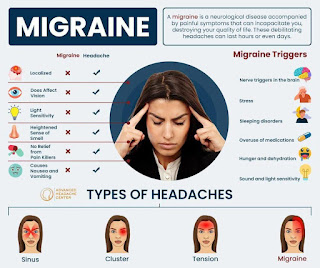Migraines are a debilitating neurological disorder that affects millions of people worldwide. These intense headaches can cause severe pain, disrupt sleep, and hinder daily activities. In this article, we will explore what migraines are, their symptoms, triggers, and how to manage them naturally using holistic health approaches.
What is a Migraine?
A migraine is not just a headache—it's a neurological disorder that begins with intense, often unbearable pain, typically felt around the temples. This pain is usually accompanied by throbbing or pulsating sensations. However, the discomfort doesn't end there. Migraines often last for extended periods, sometimes for hours or even days.
Other symptoms associated with migraines include dizziness, nausea, and vomiting. Unfortunately, many migraine sufferers struggle to find permanent relief, despite consulting multiple doctors or trying various medications. The chances of achieving complete relief through traditional treatments alone can be limited.
Common Migraine Triggers
People who suffer from migraines are often highly sensitive to certain environmental factors. These triggers include:
- Bright Lights – Exposure to harsh, bright lights can worsen migraine symptoms.
- Loud Sounds – High-volume sounds or noise can be overwhelming for migraine sufferers.
- Cold Foods – Consuming very cold food or beverages can sometimes trigger migraines.
- Strong Odors – Certain smells, such as perfumes or strong chemicals, can intensify pain.
- Sleep Disruptions – A lack of sleep or irregular sleep patterns can trigger or worsen migraines.
- Stress – Emotional stress is a common migraine trigger, causing tension and exacerbating symptoms.
Natural Solutions for Migraine Relief
While it may seem difficult to find effective solutions for migraines, there are several natural remedies and lifestyle changes that can offer long-term relief:
- Herbal Remedies – Herbal teas like ginger, peppermint, or chamomile can help reduce inflammation and alleviate nausea.
- Essential Oils – Lavender and peppermint essential oils are known to ease headache pain and promote relaxation.
- Magnesium – Low magnesium levels are often linked to migraines. Consider magnesium supplements or magnesium-rich foods like spinach, almonds, and avocado.
- Acupressure – Stimulating pressure points on the body can help alleviate migraine symptoms and improve circulation.
- Mindfulness and Meditation – Relaxation techniques such as deep breathing, yoga, and meditation can help reduce stress and prevent migraines.
- Dietary Adjustments – Avoiding foods that trigger migraines, such as processed foods, alcohol, and caffeine, can help reduce the frequency of attacks.
Top FAQ's about Migraines
1. What causes migraines?
Migraines are caused by a combination of genetic and environmental factors. Triggers like stress, food sensitivities, and hormonal changes can provoke migraine attacks.
2. How long do migraines typically last?
Migraines can last anywhere from a few hours to several days. The severity and duration depend on the individual and the effectiveness of treatment.
3. Can I cure migraines completely?
While there is no permanent cure for migraines, holistic treatments and lifestyle adjustments can help manage and reduce the frequency of attacks.
4. Are there any foods I should avoid to prevent migraines?
Yes, certain foods like chocolate, caffeine, alcohol, and processed meats are common migraine triggers and should be avoided.
5. How can I naturally relieve migraine pain?
Natural remedies include herbal teas, essential oils, acupressure, magnesium supplements, and stress-reducing practices like yoga and mindfulness.
Conclusion
Migraines can be a terrifying and debilitating condition, disrupting daily life and causing immense pain. While traditional treatments may not always provide permanent relief, adopting a holistic approach to health and wellness can help manage symptoms and improve your quality of life. By understanding your migraine triggers and incorporating natural remedies, you can find ways to reduce the frequency and severity of attacks, ultimately leading to a more balanced and healthier lifestyle.
Remember, if you're struggling with migraines, it's essential to consult with a healthcare professional to determine the best approach for your specific needs.

%20Foods%20That%20May%20Ease%20Your%20Pain.jpg)




%20Benefits,%20Nutrition,%20Side%20Effects,%20and%20How%20to%20Use.jpg)




No comments:
Post a Comment